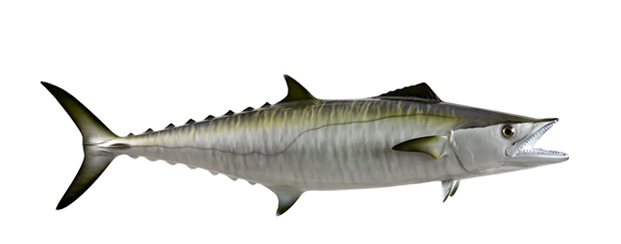Mackerel, King

View Regulations

Scientific Name
Scomberomorus cavalla


Common Names
Kingfish, Sierra, Cavalla


Description
King Mackerel have almost a bowling pin shaped body with flat sides giving a streamlined appearance. They have bright silver sides with a darker grey back and no spots. Occasionally the back can be of a bluish or olive color as well. In juvenile fish King Mackerel can have similar spots as the Spanish Mackerel however these spots begin to fade with age and most mature King Mackerel are spotless.


Habitat & Behaviour
King Mackerel often gather in schools around sources of food, usually near underwater and above water structures such as reefs, wrecks, buoys or piers. It is not uncommon for the largest of the fish to become solitary, subsisting without help of a school. These fish are also highly migratory preferring to move seasonally to more suitable waters.


Natural Prey
King Mackerel are aggressive feeders that subsist on a diet according to their size and maturity. King Mackerel’s subsist on a diet of smaller fish.


Handling Tips
With the a very sharp teeth you definitely want to keep fingers away from its mouth. Larger ones you can gaff behind head or grab by tail and throw ‘em in, smaller ones net. Handle with a rag if you plan to keep them, if not don’t wipe slime off them. Grab behind the head with a wet rag (into the gills) pinch with index finger and thumb. If harvesting, good tip to completely cover in ice (don’t just lay on top of ice in cooler). Add ice to salt water – makes a brine – very cold – will freeze your fish (not hard) but firms the meat up nicely for easy filleting.

- Lucky Tackle Box
- Billfish Bounty in the Heart of the Mayan World – Guatemala
- The Best Species of Shark to Catch
- How to Catch a Shark: what equipment do you need?
- The Best Winter Fishing Spots in Texas






